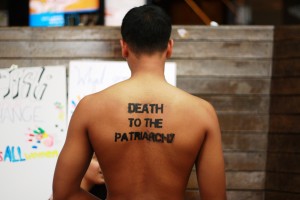by Lim Wei Klinsmann, Change Maker
Ask anyone what qualities are ideal in a man, and you’re likely to get the same answer repeatedly: confident, chivalrous, muscular, intelligent, rich. Every man – regardless of his personality, preferences or culture – is expected by mainstream society to meet this ideal of masculinity.
Those who do not are often deemed inferior for their inability or unwillingness to act out this very narrow set of personal characteristics.
I have always wondered if the people who mock those who do not conform to these expectations realise how oppressive their actions are.
My personal guess is that a very small proportion of the men in society naturally fulfils society’s requirement for “a real man”. As for the rest, the gap between who they are and who society expects them to be results in, at best, internal conflict, and at worst, being ridiculed and outcast by others.
It is no doubt difficult to endure ridicule or be ostracised for not ‘fitting in’. However, it’s equally difficult to pretend to be who we are not, everyday. Everyone makes different decisions when struggling with this dilemma, and experiences different consequences.
Personally, for me, there was a lot of controversy that I had to put up with when coming to terms this ‘masculine ideal’.
When I entered secondary school, I was a skinny, soft-spoken and shy boy who found it extremely difficult to befriend anyone. This made me a target for physical and psychological bullying. People would point out how I wasn’t as well-built as other guys, how I was not supposed to be flamboyant, and I was mocked for not “being a man”.
This constant barrage of reminders that I was not good enough made me question my own identity and left me at a loss. I felt helpless and worthless because I was only accepted by a handful of people, and ostracised by the majority.
Despite this, throughout my 4 years in secondary school, I never regretted being the way I was. While the bullying I faced in school was painful, the idea of being false to myself just so I could be like everyone else felt even worse. When I saw my other friends acting in stereotypically macho ways, it seemed clear to me that the behaviour was fake.
Even today, I still get the occasional comment about how I dress and carry myself. But I have come to embrace the fact that I am different. Yes, it would have been a lot easier to just give in and be like everyone else – I could have conformed to keeping up a stereotypical appearance of being ‘a real man’. But that would not have been me.
My hope is that people will eventually realise that there is no one ideal for what one half of the world’s population should be like, and always challenge this idea. It is to our collective benefit to work towards destroying the stereotypes that society holds over everyone’s heads, and instead, celebrate the unique, infinitely interesting things that make each individual special.
With that, I pose one final question to you:
“Who are you going to be?”


